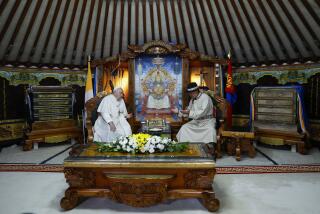He Makes Final Stop of 9-Day African Tour : Pope Salutes Malawi for Generosity to Refugees
- Share via
BLANTYRE, Malawi — Arriving in Malawi, whose economic self-sufficiency has been all but destroyed by a heavy influx of refugees from Mozambique, Pope John Paul II paid tribute Thursday to the remarkable selflessness of the people of this African country.
“The international community applauds your generosity,” the Pope said on the final stop of a nine-day visit to southern Africa. He will leave Saturday for Rome, having visited--in addition to Malawi--Madagascar, the French island of Reunion and Zambia since beginning the tour April 28.
The pontiff was greeted at Blantyre airport by perhaps the most distinctive head of state he has encountered on this trip, H. Kamuzu Banda, the nonagenarian “president for life” of Malawi.
Banda wasted no time in lecturing the Pope about his own accomplishments in leading this landlocked, resource-poor nation of 7.6 million.
“I know you’ve heard and read in the newspapers that Malawi has a very good name, especially in Europe, Australia, the United Kingdom, France, the United States. . . .” He reeled off the name of virtually every major nation in his surprisingly firm baritone.
“You’ve heard and read that Malawi is one of the best-governed countries in Africa,” he added, in what might apply more to the impeccable tidiness of Malawi’s streets, the orderliness of its crowds and the precise orchestration of its presidential rallies than to its rock-bottom per capita spending on education and health, its declining literacy rate and its level of political repression.
Banda has also lent his people something of his own religious background--a Calvinist Presbyterianism that places them among Africa’s most abstemious people. Although the country is a major exporter of tobacco, cigarette smokers are rare here. “Why consume what we can export for money?” a businessman remarked.
Catholics and Protestants
About 25% of the population is Catholic and a third is Protestant, including members of some Presbyterian splinter sects found nowhere but in Scotland and Malawi.
The welcoming ceremony was more notable for what went unsaid than for what was said. Absent from the pontiff’s and president’s remarks was any reference to apartheid, the racist policy of South Africa that was the subtext at almost every gathering on the Pope’s previous stop, in Zambia.
This was not surprising, for two African leaders could scarcely differ more in their approach to South Africa than do Banda and Zambia’s President Kenneth D. Kaunda.
Kaunda, perhaps Africa’s most obdurate foe of South Africa, maintains full diplomatic relations with the anti-apartheid African National Congress, and Banda’s Malawi is the only sub-Saharan country that maintains full diplomatic relations with Pretoria.
Banda has long held that normal relations are necessary because of the economic dependence of most southern African countries on South Africa.
For all that, the Pope’s focus on Malawi’s service to the Mozambicans was entirely appropriate. Malawi had been producing enough corn and other staples to feed itself before the vicious Mozambican guerrilla war began forcing refugees across the border three years ago. Today there are more than 600,000 Mozambicans in Malawi, many of them occupying otherwise cultivable land.
Now Malawi is an importer of food. The huge refugee population has denuded its forests in quest of firewood, leading to severe flooding in districts that had not been so inundated in more than 30 years. In the south, where the greatest concentrations of Mozambicans are found, roads crucial to the transport of farm goods have been shattered by the passage of heavy trucks carrying relief supplies.
More to Read
Sign up for Essential California
The most important California stories and recommendations in your inbox every morning.
You may occasionally receive promotional content from the Los Angeles Times.










